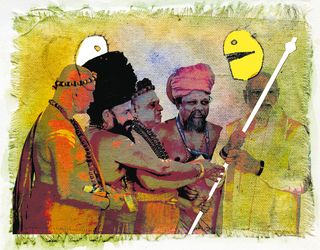Lefties and libtards are miffed with the sceptre ceremony that marked the opening of the new Parliament House. They should read Marxist historian Eric Hobsbawm. He wrote in 1983 about how invention of tradition is part of the growth of new nationalisms. We saw it happening.
Flashback to August 14, 1947. Shortly after sunset, Jawaharlal Nehru, head of the interim government who would be sworn in as the first PM of free India the next morning, had visitors at his home. Two holy men and a nagaswaram maestro, who had arrived from Thanjavur by train and taxi, wanted to bless Nehru with water from the Cauvery river, sacred ash and a sacred cloth, and gift him a specially made sengol or sceptre. Though an agnostic, Nehru obliged. The ceremony was photographed and forgotten. As the tagline of a 1996 cola ad said, “Nothing official about it.”
Fast forward to May 28, 2023. Shortly after sunrise, Narendra Modi, who was entering his 10th year as the 15th PM of free India, had a few visitors from the same mutt in the new Parliament House that he was to inaugurate a few hours later. They had performed the same ceremony the previous evening at his home, this time not as a bunch of half-naked sorcerers as Nehru might have viewed them, but as honoured guests of the Govt of India. As the nation watched on TV screens, the PM installed the sceptre beside the speaker’s chair in the Lok Sabha chamber with stately pomp and solemnity. A new tradition was born; everything official about it.
If that much was all that had happened last week, most Indians would have approved—recreation of a humble ceremony of honour, performed then on the care-worn leader of a yet-to-be-born dominion, now as a splendid ceremony of the proud republic.
Sadly, someone misled the government to go for overkill. With the result, half-truths are circulating as full truth, WhatsApp history as authentic account, and a badly made cinema clip as archival material.
Let’s get the facts. The affair of the sceptre had no Rajendra Prasad or Mountbatten. Prasad was holding another puja in his own house. Mountbatten, who was in Karachi attending Pakistan’s I-Day ceremony, had returned in the evening, and was busy locking up all viceregal stuff. Soon after the visitors had left, Nehru sat down to dinner with daughter Indira and guest Padmaja Naidu, worrying about Hindus and Muslims killing each other in the two soon-to-be-free countries. Amidst the cares, worries and a phone call from Lahore, he forgot about drafting the speech he was to deliver in the Constituent Assembly. All these are recorded in Larry Collins’s and Dominique Lapierre’s Freedom at Midnight, and Alan Campbell-Johnson’s Mission with Mountbatten.
The assembly began at 11pm; every word spoken there, every action taken, and even its moments of silence have been recorded. Vande Mataram was sung, messages from world leaders read out by Prasad, the national flag presented. Then, moving a motion on the pledge members would take at midnight, Nehru delivered his “Tryst with Destiny” speech extempore. At the stroke of midnight, members took the pledge, and Prasad declared solemnly: “I propose that it should be intimated to the Viceroy that (1) the Constituent Assembly of India has assumed power of governance of India, and (2) the Constituent Assembly of India has endorsed the recommendation that Lord Mountbatten be governor-general of India from the 15th August 1947.”
Power was not given, gifted, granted or transferred by any emperor or his viceroy; it was won and assumed by the people of India.
prasannan@theweek.in


